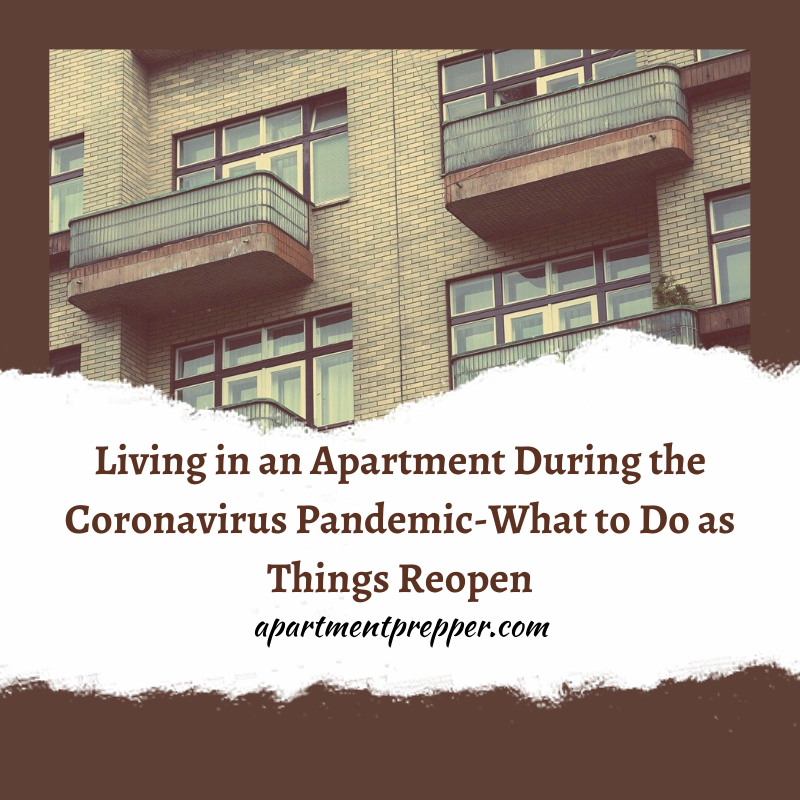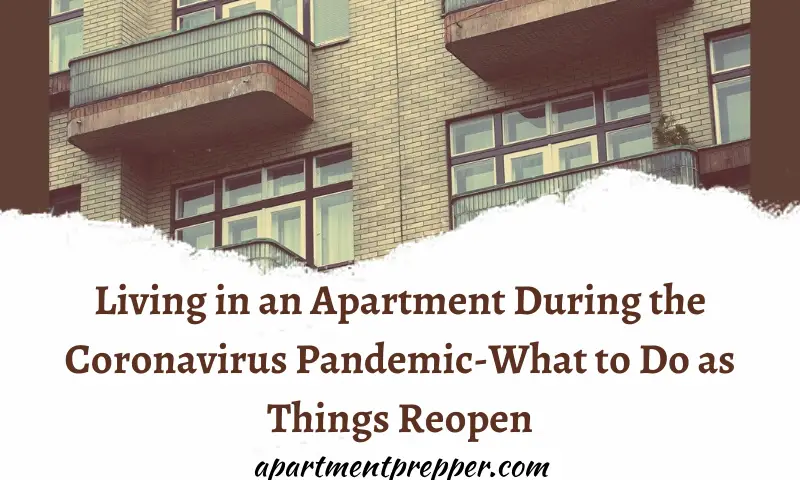This post is by Bernie Carr, apartmentprepper.com
As I write this post, many states are beginning to loosen lockdown orders, but several states still have stay-at-home restrictions with some state extending the lockdown periods. Coronavirus cases and deaths continue to mount. Some experts predict there may be a second wave, or that the virus may keep coming back during the cold season, much like the flu. So much is still unknown so we all still need to be careful to avoid catching the virus.
If you live in an apartment or any multi-family dwelling here are some tips to help keep yourself and your family safe, even as you start venturing out when things reopen.
Continue social distancing
According to the CDC, social distancing is still the best way to avoid being exposed to the virus.
“Social distancing, also called “physical distancing,” means keeping space between yourself and other people outside of your home. To practice social or physical distancing:
-
- Stay at least 6 feet (about 2 arms’ length) from other people
- Do not gather in groups
- Stay out of crowded places and avoid mass gatherings”
You may be ready to visit your favorite restaurant or movie theater once they reopen, but since the virus can still spread, it is best to avoid catching and spreading it.
If you are in the high risk category, you need to stay extra careful. You may also want to minimize visiting high risk individuals. They are more susceptible to catching the virus and it is better not to risk their health.
Avoid visiting common areas
Try to minimize visiting common areas if possible.
- Pay your rent online instead of dropping it off at the leasing office.
- Opt for online billing and online payment so you can avoid having visit your mailbox on a daily basis. Since I opted for electronic billing instead of paper bills, my mail has dropped by 95%.
- Take the stairs instead of the elevator – you’ll get some exercise and avoid having to be in an enclosed space with others.
Continue to wash your hands frequently
Continue to wash your hands as soon as possible after getting home or use a hand sanitizer. I carry a pocket sized hand sanitizer bottle in my pocket and use it as soon as I push elevator buttons, doorknobs etc. Disinfect your hands when disposing of trash in the apartment trash chute or compactor. Wash your hands as soon as you enter your apartment before touching anything else.
Don’t forget your mask
Many states mandate wearing a mask, while others have looser restrictions. I’d still recommend wearing a mask when you are out and about such as shopping for groceries.
How to deal with maintenance
If you are handy around the house, do minor repairs yourself. That is why I always recommend that apartment dwellers keep a few tools for emergencies. A couple of weeks ago, our toilet stopped flushing. Instead of calling for maintenance, we watched several YouTube videos on toilet repairs. We bought a toilet kit at Lowe’s and repaired it ourselves.
Of course if it is a major repair, such as a broken water heater or air conditioner then you must call maintenance. If that is the case, practice social distancing when the repair crew comes and wear a mask.
Continue to clean and disinfect
Keep your apartment clean and disinfect frequently touched areas. Either spray with Lysol or Clorox or wipe with disinfecting wipes doorknobs (inside and outside) faucets, light switches, cabinet knobs, stove knobs, microwave panel, trash can lids. Don’t forget your phone, keys, purses, keyboards, TV remote, your reusable water bottle, etc.
Avoid wearing shoes indoors
As we recently heard, coronavirus can be tracked with shoes. As recommended by a foot and ankle specialist whom we interviewed, avoid using outside shoes inside your home and instead wear footwear you only use indoors. Have your guests wear disposable shoe covers.
Get some exercise
With parks and trails starting to reopen, you can take walks, hike or ride your bike outdoors. I’d avoid packed beaches or any other areas that attract crowds even if they reopen.
If your apartment gym or local gym reopens, you’ll need to decide whether you feel safe enough to exercise in an enclosed space with many others. Ascertain how the equipment is being sanitized and how many people are allowed in the gym to avoid overcrowding.
An alternative to going to a gym is exercising at home and doing apartment-friendly exercises. There are a lot of good channels on YouTube that offer low-impact exercises that won’t annoy your neighbors.
What if you feel symptoms?
If you start to feel symptoms of COVID-19, call your primary care physician, or see one online. They will be able to give you instructions on what to do. Many testing centers are available now than previous months.
The CDC recommends:
“If you have a fever, cough or other symptoms such as shortness of breath or difficulty breathing, chills, muscle pain, sore throat, new loss of taste or smell, you might have COVID-19. Most people have mild illness and are able to recover at home. If you think you may have been exposed to COVID-19, contact your healthcare provider immediately. Keep track of your symptoms. And, If you have an emergency warning sign (including trouble breathing), get medical attention right away.”
If you feel symptoms, avoid going out and meeting people as you will spread the illness.
Continue preparing for emergencies
If there is one thing we have learned these past few months, disasters can happen at any time. With those disaster come shortages. Slowly building up a supply for emergencies is different from hoarding. Just buy a small quantity of foods and items family needs each time you go grocery shopping and set aside a small stockpile as space permits. Try to have at least two to three weeks worth of water and food at home.
Save some cash for emergencies if you are able.
Have a well-stocked emergency kit at home.
Assemble a power outage kit.
We don’t know how things will develop with the coronavirus, and how the lockdowns will affect the economy. With all this uncertainty, preparing for emergencies is not only prudent, it will give you peace of mind.
******************************************************************
We are an affiliate of Amazon.com, which means we received a small commission if you click through one of our Amazon links when you shop, at totally no cost to you. This helps keep the lights on at the blog. Thanks!
About the author:
Bernie Carr is the founder of Apartment Prepper. She has written several books including the best-selling Prepper’s Pocket Guide, Jake and Miller’s Big Adventure, The Penny-Pinching Prepper and How to Prepare for Most Emergencies on a $50 a Month Budget. Her work appears in sites such as the Allstate Blog and Clark.com, as well as print magazines such as Backwoods Survival Guide and Prepper Survival Guide. She has been featured in national publications such as Fox Business and Popular Mechanics. Learn more about Bernie here.
Image by StockSnap from Pixabay


